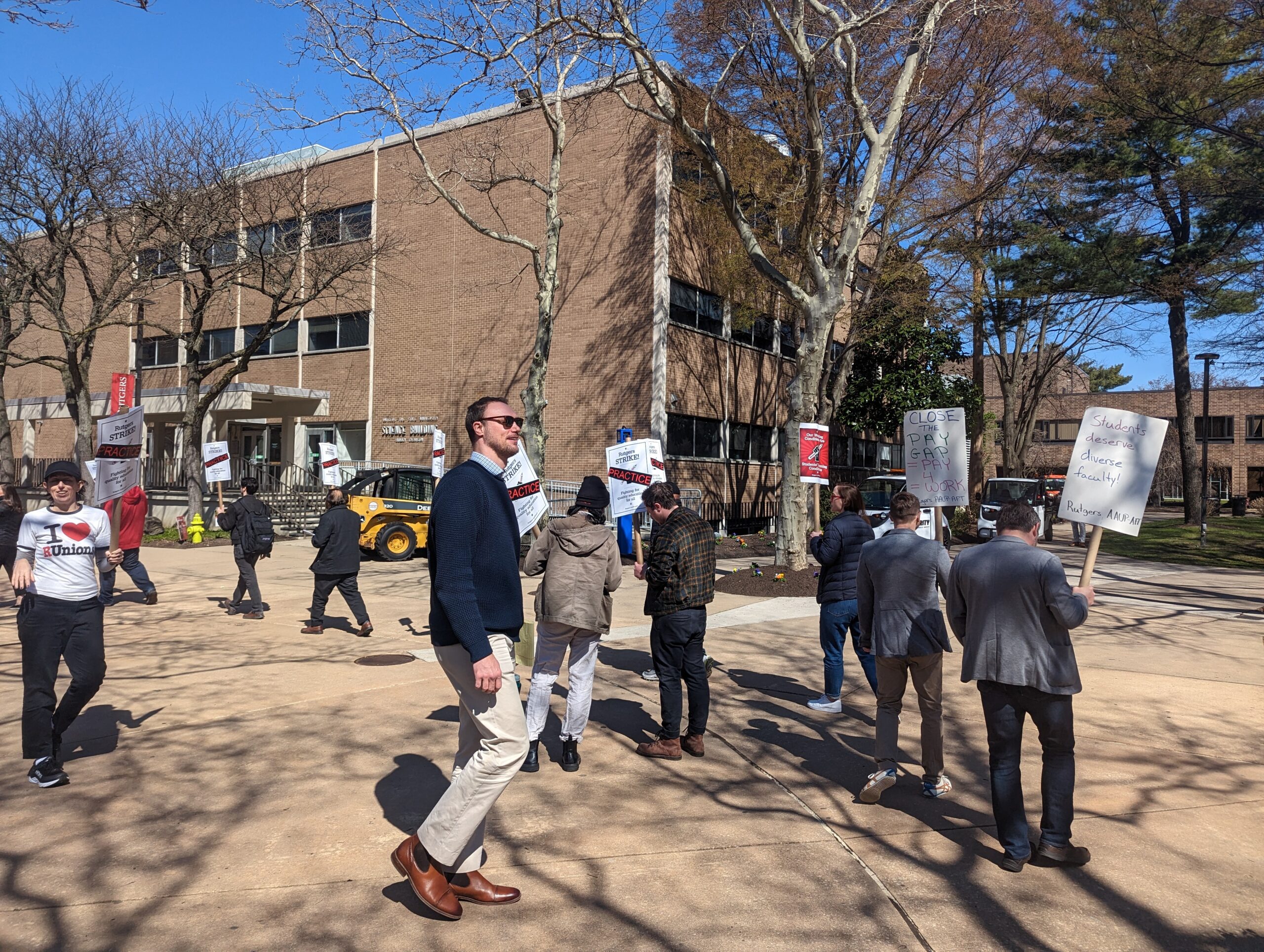
Striking Out: The Recent Past – and Near Future – of Labor Unions at Rutgers Camden
Photos and Story by Julio Dagand
These days the presence of education and educators in the news is a regular and expected factor, with workers from across the educational sector ranging from primary school to accredited universities regularly pitted against politicians, parental groups, and the very institutions of learning they work for on local and national levels.
Rutgers Camden has not been spared from this upheaval. The adjunct faculty union, a longtime fixture on campus, had their demands escalate into a fully fledged strike in the spring of last year. Now, on the one year anniversary of these events, students and faculty alike have had the chance to ponder the role of labor in their daily lives on and off campus. A handful of Rutgers Camden Students were able to offer their opinions on the matter of the strike, how it affected their studies in 2023, and how they look back on it now in 2024.
Erica Nebrich, a Business Management major from the class of 2024, spoke mainly in support of the union and their efforts: “I think it was nice to see them sticking up for themselves… Wasn’t it for better benefits[…]They could probably listen better, negotiate with the union better.”
Angie, a health sciences major in the class of 2026, agreed that many adjuncts had helped teach them and expressed shock at the conditions under which the adjuncts and part time faculty were expected to teach at our university: “It was really sad, you know: to find out that these people are just trying to live day to day just like us…” she remarked, mentioning the fact that some part time faculty at Rutgers Camden can and often do find themselves spread teaching between multiple part time positions at multiple universities just to make a living.
Her friend Reese, a Psychology major in the class of 2025, added: “It was an informative experience for sure, to hear about how professors are in positions where they don’t know if they have a job next semester…. These professors are trying their best in the situations that they have and what they’re going through, especially not to get benefits for all the work they do.”
Rumors around campus had tipped students off that a strike would have been happening, and worries about the school year being disrupted appeared, according to students speaking on the matter now, like Nebrich, who added, “I had heard some classes were getting canceled but honestly only one of my classes got canceled I think. It didn’t disrupt me.”
A few students even had taken it upon themselves to interact with and talk with the affected faculty during the strike, like Angie, and are even now keeping their eyes and ears open for any more word from the unions: “I’ve been a little too busy to talk one on one with them, but I still like to pay attention, and follow them on Instagram and stuff,” Angie says.
For those unaware or those who might not have been present, the strike was founded upon a common list of demands, the origins of which union Vice-President, and member of the Philosophy and Religion Department, Austin Rooney was able to shed some light on:
“We surveyed our members. We started a year before the contract expired at the end of spring ‘22, and we had surveyed our members prior to that so that we knew what was important to them. Three main demands were the top priorities for our members across the board: wages, job security, and healthcare.”
The prospect of a strike isn’t only a thing of the past at this campus. In response to the issues covered in part by the Gleaner in its March 27th feature G.I. Blues, there have now been statements from the Office of Military and Veterans Affairs stating that they could potentially begin a formal protest which would include a strike. On April 2nd emails were sent from a source at the OMVA to select individuals, which read among other things:
“The Chancellor’s Spring address was held on March 26th and we went out to distribute information regarding what was happening on campus. We had some folks come up and talk to us about what we are trying to accomplish, the dialogue was great. Since I had told Chancellor Tillis a formal protest was likely the next course of action, he had a representative from his office reach out to Mr. Davis (Director of the Veterans Office) and informed him that those of us that participated in any formal protest would not be paid while we are protesting. I don’t have a problem with that. If I’m not working I shouldn’t be paid during that time. This “threat” just shows more of their character. During my time overseas I met much more determined men than Chancellor Tillis. My easiest days in the military were much harder than negotiating with a politically motivated bureaucrat.
I wanted to take the time to provide an update for you all and hopefully keep our efforts in your mind. Your continued pressure on Chancellor Tillis is what will help bring him to the table. If Mr. Mellitz is met with resistance by Chancellor Tillis and a meeting can not be brokered then we will be moving forward with getting media attention. Chancellor Tillis will recognize that without the men and women of the United States Armed Forces that he would not have the luxury of being overpaid at a college university that was saved from bankruptcy by Revolutionary War Veteran Henry Rutgers.”
When asked to elaborate on some of its points and to comment on the recent history of strikes on campus, OMVA Student Worker Jake Kopach responded:
“I had been made aware early on of the possibility of a strike through others in the Social Work program. Camden and Newark sometimes get, you know, the short end of the stick or a raw deal in terms of funding… I would say that obviously they accomplished a good turnout for what they wanted, I’m sure not all of their [demands] were met, but I’m also not exactly sure of the ins and outs were at this point in time. The basic premise is still there for both of us, though. Both groups want the university to be held accountable for the negligence that has been happening on both sides.”
For his part, on hearing the Office of Military and Veteran Affairs could be pursuing a strike, Mr. Rooney wished the OMVA well from one faculty member to another: “I’m saddened but not shocked, it’s sort of the age that we live in, the exploitation of those who have sacrificed. We see it with educators, nurses, and the military of course. I’m just hearing about this now and unfortunately can’t comment at length, but I’d love to get in contact with them and maybe as part of the coalition building of labor unionizing we can get in touch.”
The aforementioned coalition building was a recurring topic of discussion with Mr. Rooney, who also emphasized the importance of solidarity and teamwork in labor organizations: “Well, [we learned] the importance of working together this past semester with our strike. Solidarity is the slogan of unions, so we really had to learn the importance of forming coalitions and working together with your coworkers in those unions. We’re extremely proud of the contract gains that were made, but we recognize that they could not have been made if we were working in isolation… We were very successful but it was also exhausting. A lot of people worked in unison, with different needs and perspectives on what could and should be accomplished. Regarding the lecturer unit, our morale remains pretty high and we’re ready to press on and ensure that our contract is honored. We weren’t able to get subsidized healthcare, but we are moving forward at the legislative level to get that moving as opposed to just the level of working with rutgers. Whenever any big wage gains are made like what we got, the common response of management is usually to slash jobs. We’ve seen at NB the announcement that they’re going to slash the writing department staffed mostly by adjuncts, so we made sure to include the writing department in our demands, that’s the nature of labor that all forms of labor need to work together. Our energy is good and it will only continue to get stronger over the course of this long fight.”

